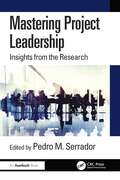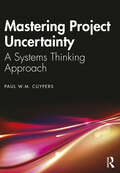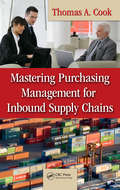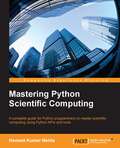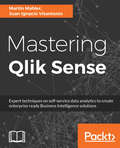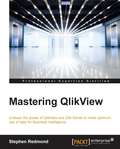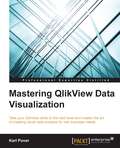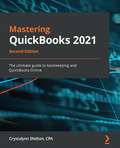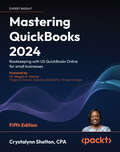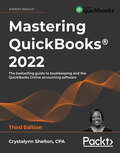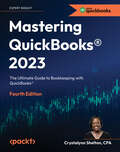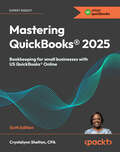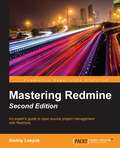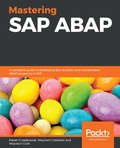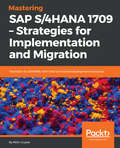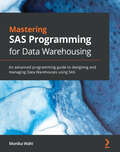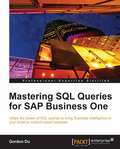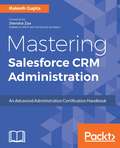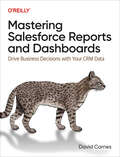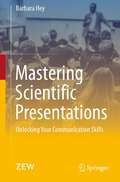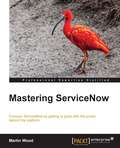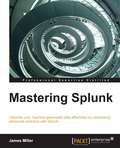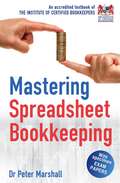- Table View
- List View
Mastering Project Leadership: Insights from the Research
by Pedro M. SerradorThis is a collection of essays from key researchers in the field of project management who describe what they feel are the most impactful findings from research. In the challenging and competitive world of project management, project managers need all the insight they can get. Leading researchers share what they believe are the most important findings from the research being done today. These cover pressing topics confronting project managers, including hybrid methodologies, schedule overruns, schedule estimation, project efficiency, and managing local stakeholders. Highlights include the following: Jeff Pinto and Kate Davis explore the “Normalization of Deviance” (NoD) phenomenon within various organizational settings, focusing on projects. NoD involves the gradual acceptance of deviant practices, diverging from established norms, and often leading to detrimental outcomes. Francesco Di Maddaloni investigates how local communities’ stakeholders are perceived, identified, and categorized by project managers in major public infrastructure and construction projects (MPIC). His chapter helps project managers to have a better understanding of a more inclusive and holistic approach to engage with a broader range of stakeholders. Lavagnon Ika, Peter Love, and Jeff Pinto suggest that error and bias combine to exact a toll on major projects, offer theoretical insights, and outline practical recommendations for project managers. Jonas Söderlund offers managerial guidelines for leveraging deadlines as powerful tools for generating project success. Pedro M. Serrado looks at empirical studies that link planning quality to project success, emphasizing its importance. He also discusses the downsides of excessive planning, particularly in dynamic environments and research and development projects.
Mastering Project Uncertainty: A Systems Thinking Approach
by Paul W.M CuypersUncertainty permeates every thinkable aspect of project work and mastering information awareness and availability is the key to controlling benefits, budgets, and timelines. This book offers a theoretical framework and practical guidelines to systematically minimize uncertainty, thereby increasing the chances of project success. To paraphrase Henry Ford, transitioning from traditional risk management to mastering project uncertainty implies abandoning the quest for faster horses in favor of driving cars toward your project’s destination. This book presents the road map to this transition, with Part I providing a theoretical foundation for uncertainty management using systems thinking. Part II introduces strategies supported by practical techniques to master uncertainty through: 1. Raising information awareness 2. Increasing information availability 3. Improving the effective use of information 4. Maximizing information efficiency. This book’s combined theoretical and highly practical approach, is essential reading for scholars, academics, business leaders, project managers, strategists, and policymakers to bring the organization’s vision for a sustainable future to life.
Mastering Public Relations
by Shannon A. Bowen Brad Rawlins Thomas MartinThis book provides an executive review of the field of public relations with a focus on what managers need to know in order to master the function quickly and effectively. Throughout the text, we integrate the academic with the professional by asking, how can an executive use this knowledge to make the most of the public relations function, department, and initiatives in order to help their whole organization be successful? , , , and of the book provide the busy manager with the taxonomy of the public relations field, provide research on the theory of public relations, and examine the structure of organizations and where public relations fits within that structure. , , , and examine how public relations should be conducted in order to achieve maximum results and provide a comprehensive review of public relations strategy, including how to conduct a public relations campaign. , , , and discuss the organizational settings most common in public relations: corporate, agency, government, or public affairs and nonprofit or advocacy groups and the public relations approaches common in each. We review what research finds regarding the most excellent ways to manage public relations and the best ways to analyze and address the ethical challenges to be faced in public relations. We occasionally use short case examples to illustrate and apply the main points managers will need to know in order to manage public relations effectively. Throughout this book, we focus on the managerial pursuits in public relations, such as strategic relationship maintenance, segmentation of publics, and conducting research. We offer insight into the managerial activities of issues management, lobbying and advocacy, creating stakeholder relationships, reputation management, ethical counsel, and corporate communication. We examine the most current thought in public relations to help the busy manager master the most important concepts in the field quickly, accessibly, and with an eye toward helping an organization or client achieve the most effective results through cutting-edge, modern, research-based strategic public relations management.
Mastering Purchasing Management for Inbound Supply Chains
by Thomas A. CookImporting finished products, components, and raw materials has become the status quo in today‘s increasingly competitive business landscape. The lessons of inbound supply, however, can be very costly if learned through a trial-and-error approach especially foreign purchasing. By not understanding the parameters of landed costs alone, purchasing man
Mastering Python Scientific Computing
by Hemant Kumar MehtaA complete guide for Python programmers to master scientific computing using Python APIs and tools About This Book * The basics of scientific computing to advanced concepts involving parallel and large scale computation are all covered. * Most of the Python APIs and tools used in scientific computing are discussed in detail * The concepts are discussed with suitable example programs Who This Book Is For If you are a Python programmer and want to get your hands on scientific computing, this book is for you. The book expects you to have had exposure to various concepts of Python programming. What You Will Learn * Fundamentals and components of scientific computing * Scientific computing data management * Performing numerical computing using NumPy and SciPy * Concepts and programming for symbolic computing using SymPy * Using the plotting library matplotlib for data visualization * Data analysis and visualization using Pandas, matplotlib, and IPython * Performing parallel and high performance computing * Real-life case studies and best practices of scientific computing In Detail In today's world, along with theoretical and experimental work, scientific computing has become an important part of scientific disciplines. Numerical calculations, simulations and computer modeling in this day and age form the vast majority of both experimental and theoretical papers. In the scientific method, replication and reproducibility are two important contributing factors. A complete and concrete scientific result should be reproducible and replicable. Python is suitable for scientific computing. A large community of users, plenty of help and documentation, a large collection of scientific libraries and environments, great performance, and good support makes Python a great choice for scientific computing. At present Python is among the top choices for developing scientific workflow and the book targets existing Python developers to master this domain using Python. The main things to learn in the book are the concept of scientific workflow, managing scientific workflow data and performing computation on this data using Python. The book discusses NumPy, SciPy, SymPy, matplotlib, Pandas and IPython with several example programs. Style and approach This book follows a hands-on approach to explain the complex concepts related to scientific computing. It details various APIs using appropriate examples.
Mastering Qlik Sense: Expert techniques on self-service data analytics to create enterprise ready Business Intelligence solutions
by Juan Ignacio Vitantonio Martin MahlerMaster the capabilities of Qlik Sense to design and deploy solutions that address all the Business Intelligence needs of your organizationKey FeaturesCreate compelling dashboards and visualizations with your data by leveraging Qlik Sense's self-service modelPerform data loading and model efficient solutions with faster performance and better governanceMaster Qlik Sense’s APIs and develop powerful mashups and fantastic extensions for visualizations and other components that run across all platformsBook DescriptionQlik Sense is a powerful, self-servicing Business Intelligence tool for data discovery, analytics and visualization. It allows you to create personalized Business Intelligence solutions from raw data and get actionable insights from it.This book is your one-stop guide to mastering Qlik Sense, catering to all your organizational BI needs. You'll see how you can seamlessly navigate through tons of data from multiple sources and take advantage of the various APIs available in Qlik and its components for guided analytics. You'll also learn how to embed visualizations into your existing BI solutions and extend the capabilities of Qlik Sense to create new visualizations and dashboards that work across all platforms. We also cover other advanced concepts such as porting your Qlik View applications to Qlik Sense,and working with Qlik Cloud. Finally, you'll implement enterprise-wide security and access control for resources and data sources through practical examples.With the knowledge gained from this book, you'll have become the go-to expert in your organization when it comes to designing BI solutions using Qlik Sense.What you will learnUnderstand the importance of self-service analytics and the IKEA-effectExplore all the available data modeling techniques and create efficient and optimized data modelsMaster security rules and translate permission requirements into security rule logicFamiliarize yourself with different types of Master Key Item(MKI) and know how and when to use MKI.Script and write sophisticated ETL code within Qlik Sense to facilitate all data modeling and data loading techniquesGet an extensive overview of which APIs are available in Qlik Sense and how to take advantage of a technology with an APIDevelop basic mashup HTML pages and deploy successful mashup projectsWho this book is forThis book is for Business Intelligence professionals and Data Analysts who want to become experts in using Qlik Sense. If you have extensively used QlikView in the past and are looking to transition to Qlik Sense, this book will also help you. A fundamental understanding of how Qlik Sense works and its features is all you need to get started with this book.
Mastering QlikView
by Stephen RedmondIf you are a business application developer or a system analyst who has learned QlikView and Qlik Sense and now want to take your learning to a higher level, then this book is for you. It is assumed that you are aware of the fundamentals of QlikView and have working knowledge of development and in-memory analytics.
Mastering QlikView Data Visualization
by Karl PoverTake your QlikView skills to the next level and master the art of creating visual data analysis for real business needs About This Book * Explore how to create your own QlikView data laboratory and how to develop QlikView applications using agile project methods * Implement advanced data visualization and analysis for common business requirements from the sales, finance, marketing, inventory, operations, and human resources departments * Learn from real-life experience shared in this book that will give you the upper hand in your next QlikView project Who This Book Is For This book is intended for developers who want to go beyond their technical knowledge of QlikView and understand how to create analysis and data visualizations that solve real business needs. You should have a basic understanding of advanced QlikView functions. What You Will Learn * Apply advanced QlikView techniques such as set analysis and nested aggregation in order to deliver common business requirements * Understand real business requirements for sales, finance, marketing, and human resources departments * Discover when to apply more advanced data visualization such as frequency polygons, bullet graphs, and XmR charts * Go beyond native QlikView and include geographical analysis, planning, and sentiment analysis in your QlikView application * Troubleshoot common errors we discover at the moment we visualize data in QlikView * Develop a plan to master Qlik Sense data visualization In Detail Just because you know how to swing a hammer doesn't mean you know how to build a house. Now that you've learned how to use QlikView, it's time to learn how to develop meaningful QlikView applications that deliver what your business users need. You will explore the requirements and the data from several business departments in order to deliver the most amazing analysis and data visualizations. In doing so, you will practice using advanced QlikView functions, chart object property options, and extensions to solve real-world challenges. Style and approach This hands-on guide follows the story of a company implementing QlikView as its enterprise data discovery solution. Each chapter starts with an understanding of the business requirements and the data model, and then helps you create insightful analysis and data visualizations. Each chapter expands on what was done in the previous chapter as we follow this continuously improving iterative process.
Mastering QuickBooks 2021: The ultimate guide to bookkeeping and QuickBooks Online, 2nd Edition
by Crystalynn SheltonThis second edition of the bestselling Mastering QuickBooks 2020 is updated and improved to focus on advanced QBO features, techniques for managing sales taxes, and budgeting and reporting best practicesKey FeaturesUnderstand how to manage sales taxes and transactionsExplore advanced bookkeeping techniques such as using the custom chart builder, importing budgets, and performing smart reporting with FathomBecome proficient in using QuickBooks Online and implement best practices to avoid costly errorsBook DescriptionIntuit QuickBooks is an accounting software package that helps small business owners to manage all their bookkeeping tasks independently. This latest edition of Mastering QuickBooks takes you through the range of new features and updates available in QuickBooks Online (QBO). Creating multilingual invoices, tracking mileage, working with a cash flow dashboard that helps you with cash forecasting and planning reports, and uploading a batch of bills and checks are just a few of the new features covered in this edition. As you progress, you'll learn how to manage sales tax, including how to set up, collect, track, pay, and report sales tax payments. Dedicated sections will also take you through new content focused on the latest features in the QBO line-up, while also showing you the different types of businesses that can benefit from QBO Advanced. In addition to this, you'll explore how to export reports to Google Sheets, use the custom chart builder, import budgets, perform smart reporting with Fathom, and much more. By the end of this QuickBooks book, you'll be well-versed with the features of QuickBooks and have the confidence to manage all your bookkeeping tasks with ease.What you will learnDiscover the new features of QBO and find out what the QBO line-up offersGet to grips with bookkeeping concepts and the typical bookkeeping and financial accounting cycleSet up QuickBooks for both product-based and service-based businessesTrack everything from billable and non-billable time and expenses to profitGenerate key financial reports for accounts, customers, jobs, and invoice itemsUnderstand the complete QuickBooks payroll process and track payments made to 1099 contractorsManage various bank and credit accounts linked to your businessWho this book is forThe book is for small business owners and bookkeepers or accounting students who want to learn QuickBooks Online and understand how to implement and use it effectively. Whether you're a bookkeeping beginner or have some experience already, this book will help you learn to use Intuit QuickBooks Online confidently.
Mastering QuickBooks 2024: Bookkeeping with US QuickBooks Online for small businesses
by Crystalynn SheltonTake control of your business finance by using QuickBooks Online for US for your accounting, budgeting, and reporting.Key FeaturesLearn to use QBO from scratch following professional CPA advice, accompanied with fully-updated instructions and screenshotsTailor QBO to your specific business needs with customization and integrationStreamline your billing, expense tracking, and financial reportingBook DescriptionIn today's competitive business landscape, efficient financial management is crucial for success. QuickBooks Online has emerged as the go-to accounting software for small businesses, offering a user-friendly platform to manage finances, track expenses, and gain valuable insights. This new edition will help you use QuickBooks Online from scratch and customize it to suit your small business needs. Written by accounting expert Crystalynn Shelton, it takes you on an in-depth journey, from setting up your account to mastering advanced features and customizations. This book empowers you to conquer the latest features of QuickBooks Online 2024, overcome challenges encountered during migration from desktop to online; plan cash flow, profits, revenue with precision; and streamline billing, expense tracking, and financial reporting. As you progress, you’ll learn to manage sales tax, including how to set up, collect, track, pay, and report sales tax payments. You’ll explore how to export reports to Google Sheets, use the custom chart builder, import budgets, and perform smart reporting with with using data sync with Excel. You'll learn how to tailor QuickBooks Online to your specific business needs. By the end of the book, you’ll master the art of QuickBooks Online and take control of your business financesWhat you will learnA crash course on basic accounting conceptsOvercome challenges encountered during migration from QBD to QBORecord income and expenses, pay vendors, and manage payrollStreamline client billing with invoicing and quoting templatesUse QuickBooks Online for tax filing and deadline managementPlan cash flow, profits, and revenue with the Report CenterCustomize financial reports and sales forms for your requirementsCalculate depreciation and automate workflows with QBO AdvancedWho this book is forThe book is for small business owners, bookkeepers, and accounting students who want to learn QuickBooks Online and understand how to implement it effectively. Whether you’re a bookkeeping beginner or have some experience already, this book will help you learn to use Intuit QuickBooks Online confidently.
Mastering QuickBooks® 2022: The bestselling guide to bookkeeping and the QuickBooks Online accounting software, 3rd Edition
by Crystalynn SheltonThis third edition of the bestselling Mastering QuickBooks® is updated for 2022 and now goes above and beyond the topics covered on the QuickBooks Certified User (QBCU) examKey FeaturesLearn QuickBooks Online (QBO) from scratch and get confident with best practicesFully revised with the latest updates to QuickBooks OnlineBrush up with everything you need to prepare for the QBCU examBook DescriptionHandling the financial side of your growing business requires expertise. What if there's an easier path to manage accounting and track profits? With Mastering QuickBooks® 2022, Third Edition, you can build the perfect budget, simplify tax return preparation, manage inventory, track job costs, generate income statements and financial reports, and perform all accounting-related tasks with ease. Crystalynn Shelton is an experienced Certified Public Accountant and Advanced Certified QuickBooks ProAdvisor who will guide you through using QuickBooks Online, from setup to core features and beyond. This new edition has every chapter revised to cover a range of new features and updates available, including smart invoicing and cash flow projections. You'll learn how to create multilingual invoices, track mileage, work with a cash flow dashboard that helps you with cash forecasting and planning reports, and upload batches of bills and checks. You'll also learn how to manage sales tax, including how to set up, collect, track, pay, and report sales tax payments. In addition to this, you'll explore how to export reports to Google Sheets, use the custom chart builder, import budgets, and perform smart reporting. By the end of this book, you'll be well-versed with QuickBooks and have the confidence to manage all your bookkeeping tasks with ease.What you will learnGet to grips with bookkeeping concepts and the typical bookkeeping and financial accounting cycleSet up QuickBooks for both product-based and service-based businessesDiscover the new features of QBO and find out what the QBO line-up offersTrack everything from billable and non-billable time and expenses to profitGenerate key financial reports for accounts, customers, jobs, and invoice itemsUnderstand the complete QuickBooks payroll process and track payments made to 1099 contractorsManage various bank and credit card accounts linked to your businessWho this book is forThis QuickBooks book is for small business owners, bookkeepers, and accounting students who want to learn QuickBooks Online and understand how to use it effectively.Whether you're a bookkeeping beginner, have some experience already, or are studying to become a QuickBooks Certified User, this book will help you learn to use Intuit QuickBooks Online confidently.
Mastering QuickBooks® 2023: Bookkeeping with US QuickBooks Online for Small Businesses, 4th Edition
by Crystalynn SheltonConfidently handle bookkeeping for your business with QuickBooks, learn how to use advanced QBO features, gain techniques for managing sales taxes and budgeting, and discover the best practices for reporting in this fourth, fully updated edition optimized for the US.Purchase of the print or Kindle book includes a free eBook in PDF format.Key FeaturesBecome proficient from a beginner level using QuickBooks Online and implement the best practices to avoid costly errorsExplore advanced bookkeeping techniques such as reconciling bank and credit card accounts, importing budgets, creating customized user permissions, and exporting business analytics with ExcelUnderstand how to manage sales taxes and transactionsBook DescriptionHandling the financial side of your growing business requires expertise — but what if there's an easier path to managing accounting and tracking profits without the expense of hiring trained professionals?Mastering QuickBooks® 2023, Fourth Edition, helps you learn QuickBooks Online (QBO) from scratch. Throughout the book, you'll be guided by an experienced Certified Public Accountant and Advanced Certified QuickBooks ProAdvisor – from setup to core features and beyond.You'll find out how to create multilingual invoices, track mileage, work with a cash flow dashboard that helps you with cash forecasting and planning reports, and upload batches of bills and checks.Every chapter in this new edition was revised to cover a wide range of new features and updates available, including smart invoicing and cash flow projections.You'll also learn how to manage sales tax, including how to set up, collect, track, pay, and report sales tax payments, before diving into the different types of businesses that can benefit from QBO Advanced. You'll then explore how to export reports to Google Sheets, import budgets, and use workflows to create automatic custom reminders for internal staff and customers.By the end of this book, you'll be well-versed with QuickBooks Online and have the confidence to manage all your bookkeeping tasks with ease.What you will learnTackle bookkeeping concepts and the typical US bookkeeping and financial accounting cycleDiscover QBO's newest features, such as recording upfront deposits on estimates, the simplified business view navigation menu, and improvements to bank reconciliationsTrack everything from billable and non-billable time to expenses and profitGenerate key financial reports for accounts, customers, jobs, and invoice itemsUnderstand the complete QuickBooks payroll processWho this book is forThis book is for small business owners, bookkeepers, and accounting students who want to learn QuickBooks Online and understand how to implement and use it effectively.This book is a great way for beginners to gain confidence and expertise using QuickBooks. That said, it is also an exhaustive resource for those with some bookkeeping experience
Mastering QuickBooks® 2025: Bookkeeping for small businesses with US QuickBooks® Online
by Crystalynn SheltonThis new edition of the bestselling guide to the QuickBooks Online accounting software comes with a free PDF eBook, plus bonus chapters and video tutorials from the author on reconciling transactions, the Report Center, and more.Key FeaturesEnsure accurate payroll processing and 1099 contractor tracking with latest features for compliance and smooth paymentsLearn advanced reporting techniques and inventory management tools to streamline tracking, decision-making, and business insightsAccess exclusive video tutorials and bonus chapters on bookkeeping, financial reporting, and QuickBooks Online AdvancedBook DescriptionMastering QuickBooks® 2025 is the definitive guide for small-business owners, bookkeepers, and accounting students. This new edition covers both the fundamentals, like setting up the US version of QuickBooks Online, as well as advanced features, like integrating with e-commerce platforms. You'll grasp core business transactions such as sales, expenses, and payroll while ensuring compliance with tax regulations. You'll gain complete mastery of the US-based QuickBooks Online features—from setting up the platform to fi ling taxes like a professional. Updated for the latest QuickBooks 2025, this book introduces advanced topics like time tracking for hourly billing, inventory management techniques, and real-time financial reporting. Detailed guidance on payroll processing and 1099 contractor tracking is also included to help manage your financial operations. With the purchase of the book, you'll gain access to bonus chapters and video tutorials by the author, off erring deeper insights on how to navigate key reports, reconcile bank transactions, sharpen bookkeeping fundamentals, and generate detailed sales and expense reports. By the end of this book, you'll know how to effectively leverage QuickBooks Online for the fi nancial management of your business.What you will learnSet up and customize QuickBooks Online before managing vendor, product and services listAutomate tasks using workflow automation and advanced custom fieldsManage payroll and 1099 contractors for compliance and efficiencyOptimize inventory management and advanced reporting techniquesSolve common QuickBooks issues with expert troubleshooting tipsIntegrate QuickBooks Online with e-commerce and other financial toolsWho this book is forThe book is for small business owners, bookkeepers, and accounting students who want to learn QuickBooks Online and understand how to implement it effectively. Whether you're a bookkeeping beginner or have some experience already, this book will help you learn to use Intuit QuickBooks Online confidently.
Mastering Redmine - Second Edition
by Andriy LesyukAn expert's guide to open source project management with Redmine About This Book * Learn Redmine through the basic topics to the mastering ones * Customize Redmine without breaking upgrade compatibility * Become an expert of Redmine after having read this comprehensive guide with tips, tricks and best practices. Who This Book Is For This book is best suited for project managers and Redmine administrators who have working knowledge of Redmine and who now want to get advanced practical knowledge to manage and monitor projects effectively and efficiently. What You Will Learn * Forget about troubles with installing and configuring Redmine * Feel at ease with using Redmine wiki syntax * Get familiar with the permissions system and issue life cycle in Redmine * Use Redmine for issue tracking, project hosting, project management, and time tracking * Find and choose plugins, and get familiar with some of the most useful Redmine plugins In Detail Redmine is not only one of the popular open source project management applications but also one of the best project hosting and issue tracking solutions. This book is an update of our previous successful edition, Mastering Redmine. This book is a comprehensive guide that will give you a detailed practical understanding on how to effectively manage, monitor and administer complex projects using Redmine. You will get familiar with the concept of Issue Tracking and will get to know why and what makes Redmine one of the best issue trackers. Another main part of Redmine functionality, which is Managing projects shows why this is one of the best applications for project hosting. Furthermore, you will learn more about Redmine rich text formatting syntax, access control and workflow and time Tracking. Towards the end, you will unleash the power of custom fields and guides to show how to customize Redmine without breaking upgrade compatibility. By the end of the book, you will have a deep practical understanding on how to effectively monitor and manage large scale and complex projects using Redmine. Style and approach A comprehensive practical guide that will help the readers from custom configuration to integration of complex plugins and applications, and will leverage Redmine in appropriate situations for better and efficient results.
Mastering SAP ABAP: A complete guide to developing fast, durable, and maintainable ABAP programs in SAP
by Paweł Grześkowiak Wojciech Ciesielski Wojciech ĆwikTake your SAP ABAP skills to the next level by mastering ABAP programming techniques with the help of real-world examplesKey FeaturesBecome adept at building interfaces and explore ABAP tools and techniquesDiscover the modern functionalities available in the latest version of ABAPLearn the process of creating stunning HTML5 applications using SAPUI5Book DescriptionAdvanced Business Application Programming (ABAP) is an established and complex programming language in the IT industry. This book is designed to help you use the latest ABAP techniques and apply legacy constructions using practical examples.You'll start with a quick refresher on language and database concepts, followed by agile techniques for adding custom code to a modern ABAP system. After this, you will get up to speed with the complete ABAP toolset for importing data to and from different environments. Next, you'll learn how to print forms and work with the different ABAP tools for Extensible Markup Language (XML) manipulation. While covering further chapters, you'll gain insights into building stunning UI5 interfaces, in addition to learning how to develop simple apps using the Business Object Processing Framework (BOPF). You will also pick up the technique of handling exceptions and performing testing in ABAP. In the concluding chapters, you can look forward to grasping various techniques for optimizing the performance of programs using a variety of performance analysis tools.By the end of this book, you will have the expertise you need to confidently build maintainable programs in Systems, Applications, and Products (SAP).What you will learnCreate stable and error-free ABAP programsLeverage new ABAP concepts including object-oriented programming(OOP) and Model-View-Controller (MVC)Learn to add custom code to your existing SAP programSpeed up your ABAP programs by spotting bottlenecksUnderstand techniques such as performance tuning and optimizationDevelop modern and beautiful user interfaces (UIs) in an ABAP environmentBuild multiple classes with any nesting levelWho this book is forThis book is for developers who want to learn and use ABAP skills to become an industry expert. Familiarity with object-oriented programming concepts is expected.
Mastering SAP S/4HANA 1709 – Strategies for Implementation and Migration: Transition to S/4HANA with tried and tested deployment scenarios
by Nitin GuptaLearn every aspect of SAP S/4HANA and develop the skills needed to migrate from SAP ECCKey Features● Gain insight into the implementation and configuration of SAP S/4HANA ● Design business processes with SAP Central Finance● Learn the available SAP S/4HANA deployment options in depthBook DescriptionSAP S/4HANA implementation, migration, and Central Finance are the key projects being employed across the globe, with millions of consultants working day and night to implement them. Mastering SAP S/4HANA 1709 - Strategies for Implementation and Migration will allow you to gain a virtual implementation experience, and you can follow the steps to configure the learning system as per your requirements. This book focuses on several topics; each topic is covered in detail to make you a successful SAP S/4HANA professional.You will begin by understanding SAP HANA and then move toward S/4HANA and the deployment options available to customers, including what suits various customer needs. You will then understand the impact of S/4HANA on General Ledger, Asset Accounting, and Profitability Analysis; SAP notes will also be listed when needed. As you progress through the book, you explore premigration, migration, and post-migration steps including the Near Zero Downtime strategy and learn how to implement Central Finance with and without MDG using SLT. In the concluding chapters, greenfield implementations using SAP Activate methodology will also be covered.By the end of this book, you will have learned to successfully implement SAP S/4HANA projects that are customized for your business needs.What you will learnUnderstand SAP HANA and SAP S/4HANAImplement SAP S/4HANA as a greenfield implementation with SAP Activate methodologyDiscover the hidden challenges in SAP Central Finance Migrate from ECC to S/4HANA successfully in a non-disrupted roadmapExplore the change from Classic Asset Accounting to New Asset AccountingLearn to configure General Ledger, Profitability Analysis, and ControllingApply the Near Zero Downtime strategy to migration projectsWalk through Customer Vendor Integration (CVI)Who this book is forMastering SAP S/4HANA 1709: Strategies for Implementation and Migration is for project managers, solution architects, and consultants who are planning to implement SAP S/4HANA for ERP solutions and are in the process of implementing it or are currently upgrading/migrating to it.
Mastering SAS Programming
by Monika WahiThis book is for managers leading data projects, and programmers or developers using SAS who want to effectively maintain a data lake, data mart, or data warehouse.
Mastering SAS Programming for Data Warehousing: An advanced programming guide to designing and managing Data Warehouses using SAS
by Monika WahiBuild a strong foundation in SAS data warehousing by understanding data transformation code and policy, data stewardship and management, interconnectivity between SAS and other warehousing products, and print and web reportingKey FeaturesUnderstand how to use SAS macros for standardizing extract, transform, and load (ETL) protocolsDevelop and use data curation files for effective warehouse managementLearn how to develop and manage ETL, policies, and print and web reports that meet user needsBook DescriptionSAS is used for various functions in the development and maintenance of data warehouses, thanks to its reputation of being able to handle ’big data’. This book will help you learn the pros and cons of storing data in SAS. As you progress, you’ll understand how to document and design extract-transform-load (ETL) protocols for SAS processes. Later, you’ll focus on how the use of SAS arrays and macros can help standardize ETL. The book will also help you examine approaches for serving up data using SAS and explore how connecting SAS to other systems can enhance the data warehouse user’s experience. By the end of this data management book, you will have a fundamental understanding of the roles SAS can play in a warehouse environment, and be able to choose wisely when designing your data warehousing processes involving SAS.What you will learnDevelop efficient ways to manage data input/output (I/O) in SASCreate and manage extract, transform, and load (ETL) code in SASStandardize ETL through macro variables, macros, and arraysIdentify data warehouse users and ensure their needs are metDesign crosswalk and other variables to serve analyst needsMaintain data curation files to improve communication and managementUse the output delivery system (ODS) for print and web reportingConnect other products to SAS to optimize storage and reportingWho this book is forThis book is for data architects, managers leading data projects, and programmers or developers using SAS who want to effectively maintain a data lake, data mart, or data warehouse.
Mastering SQL Queries for SAP Business One
by Gordon DuThis is a practical guide providing comprehensive solutions for SQL query problems, and is full of concrete real-world examples to help you create and troubleshoot your SQL queries in SAP Business One. If you are a system administrator who uses SQL query as your tool of choice for solving specific problems throughout SAP Business One, then this book is for you. It may also be useful if you are a developer or consultant using this technology, and can benefit end users by improving your search for important business information. A rudimentary knowledge of SAP Business One and SQL Server is required to use this book efficiently. Examples covered are relevant to SBO 2007A users, for which the 8.8 release is mostly compatible. All SQL query examples within the book are verified under SQL Server 2005, so they are guaranteed to run under this release, in addition to SQL Server 2008. Non-SAP Business One users can also gain knowledge from the many examples throughout the book. It is hard to find another book with so many SQL query examples.
Mastering Salesforce CRM Administration
by Rakesh GuptaLearn about the Advanced Administration Certification Examination and build a successful career in Salesforce administration About This Book • Build your skills and knowledge to crack the Advanced Admin Certification Examination • Leverage the advanced administration capabilities of Salesforce and Salesforce1 • Optimize and extend Sales Cloud and Service Cloud applications Who This Book Is For This book is written for Salesforce admins who are looking to gain an in-depth knowledge of the Salesforce platform and grow their value in their organization. It will teach them to implement and design advanced business process automation for the benefit of their organization. What You Will Learn • Adopt Lightning Experience to improve the productivity of your organization's sales team • Create and maintain service entitlements and entitlement processes • Process Builder basic and advanced concepts • Different ways to deploy applications between environments • Best practices for improving and enriching data quality In Detail The book starts by refreshing your knowledge of common admin tasks. You will go over Lightning Experience and various security aspects. You will be shown how to implement territory management in your organization and make use of custom objects. From here, the book progresses to advanced configuration, data management, and data analytics before swiftly moving on to setting up advanced organization-wide features that affect the look and feel of the application. Extend the capabilities of your organization's Salesforce implementation by optimizing and extending Sales Cloud, Salesforce1, and Service Cloud applications. This guide will equip you with the tools you need to build a successful career in Salesforce. Style and approach The book takes a straightforward, no-nonsense approach to working with the Salesforce CRM platform. It is filled with examples, advanced use cases, and all the resources you need to be a Salesforce Jedi.
Mastering Salesforce Reports and Dashboards: Drive Business Decisions with Your CRM Data
by David CarnesEffective, repeatable, and insightful analytics are key to ROI in customer relationship management systems. Many organizations, however, lack the automated reporting tools they need to run their businesses and instead choose to massage the data in Excel. But there's a better way. Salesforce's standard reporting tools provide a rich set of features that, when combined, support a wide variety of analytics needs.This practical introduction covers all the aspects and features you need to be successful with Salesforce reports and dashboards. Author David Carnes, chairman and chief evangelist for OpFocus, shows executives, end users, and report and dashboard superusers what analytics are possible, which features report writers should ask to be enabled, and which settings and permissions system administrators need to activate.You'll learn:How to create reports using the four main report formats in SalesforceHow to create and use dashboardsMethods for storing and finding reports and dashboardsHow to leverage formulas and trending in Salesforce reportingSpecial reporting features only available in Salesforce Mobile and on the Analytics tabWays to embed report charts and dashboards in Lightning page layoutsPowerful combinations of reporting features to drive decisions
Mastering Scientific Presentations: Unlocking Your Communication Skills
by Barbara HeyThis book is a comprehensive guidebook designed specifically for researchers. Drawing from over 25 years of practical experience in presentation training and lecture coaching, combined with the latest findings from brain research, this book equips you with the essential tools to excel in scientific communication.A good talk is the key to success for any scientist. Your reputation and career depend on your ability to deliver clear, engaging presentations. In today's digital age, with virtual communication becoming increasingly important, it is crucial to adapt your presentation skills to both face-to-face and online settings.Learn how to structure your presentations effectively, visualize complex information, and create a captivating introduction. Discover tried-and-tested techniques for delivering a powerful main part and confidently handling the Q&A session. With this book, both Ph.D. students and seasoned scientists with conference experience will develop their own presentation style and enjoy sharing their work with audiences worldwide. Inside, you will find practical tips, techniques, and tricks to efficiently prepare your presentations, along with checklists and templates for a smooth and organized process. Additionally, a dedicated chapter explores the unique challenges and recommendations for virtual conferences, helping you make a seamless transition to online presentations. Invest in your scientific career by investing in your presentation skills. Let this book be your trusted companion on the path to success.
Mastering ServiceNow
by Martin WoodThis book is intended for those who are familiar with web technologies such as JavaScript. We start from the computing fundamentals to understand how ServiceNow is architected, working from the ground up to really leverage the full capabilities of the platform.
Mastering Splunk
by James MillerThis book is for those Splunk developers who want to learn advanced strategies to deal with big data from an enterprise architectural perspective. You need to have good working knowledge of Splunk.
Mastering Spreadsheet Bookkeeping: Practical Manual On How To Keep Paperless Accounts
by Peter MarshallMastering Spreadsheet Bookkeeping will equip you with the knowledge to write your accounts spreadsheets successfully. Whether you are studying for a qualification in bookkeeping or you are a small business owner needing to bring your accounts up-to-date, Mastering Spreadsheet Bookkeeping will give you the knowledge and skills do this effectively, helping you to set up your own computerized accounting package without splashing out on expensive new software. With Mastering Spreadsheet Bookkeeping you will gain a thorough knowledge of how to use spreadsheets to their fullest advantage, saving you invaluable time and labour. Aimed at students of bookkeeping and small business owners, Mastering Spreadsheet Bookkeeping takes you step-by-step through what you need to know to use spreadsheets with confidence. With its focus on MS Excel and its clear, step-by-step approach, Mastering Spreadsheet Bookkeeping will help you to develop your own computerized bookkeeping skills with confidence. In addition, exam-style questions and answers are provided for self-testing so you may consolidate your bookkeeping knowledge as you learn.
